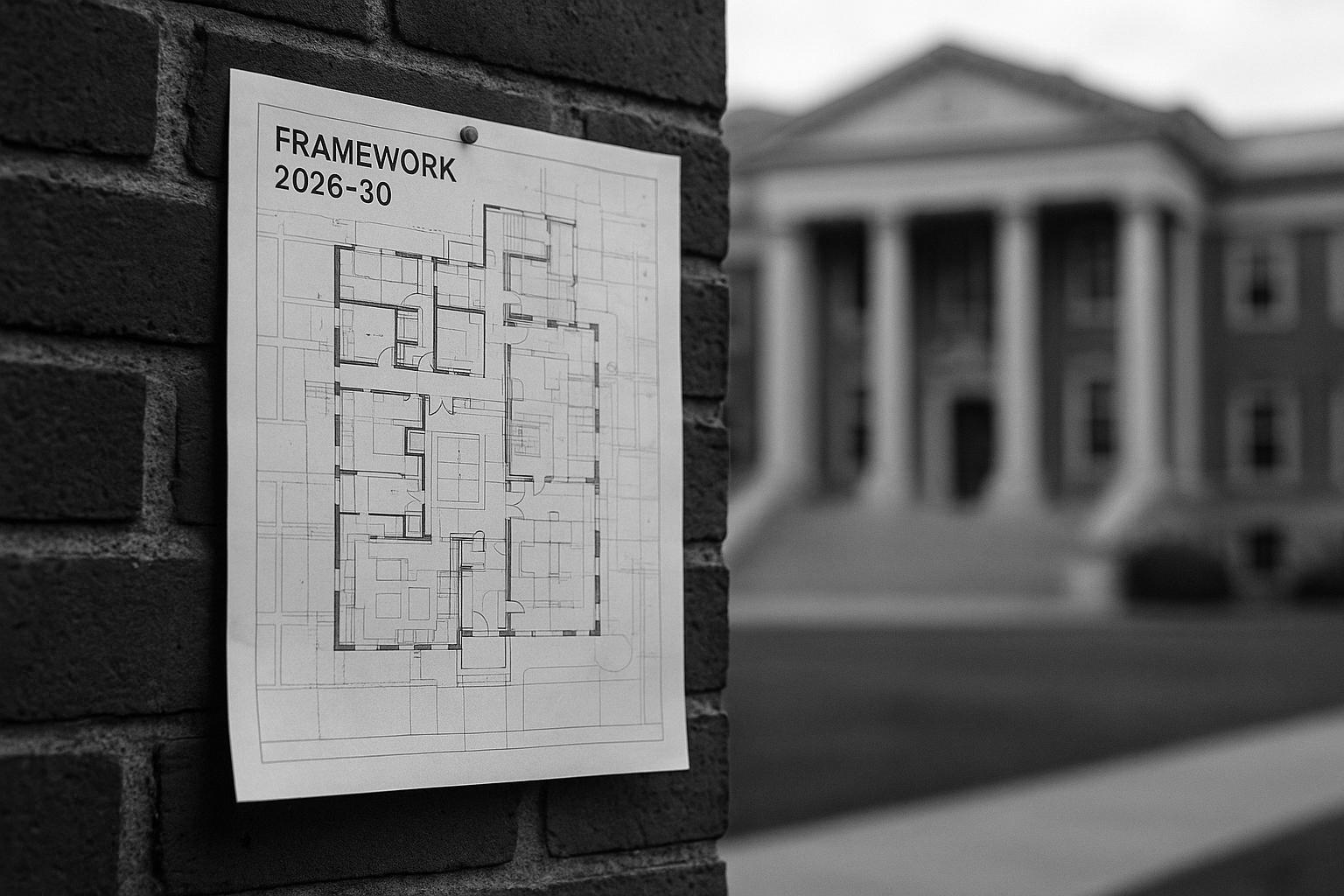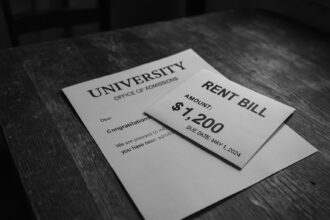Kingston University has launched a four-year, multi-supplier estates consultancy framework to support a £260m campus renewal programme, admitting up to four architectural teams and specialists across six lots for projects ranging from about £50,000 to £5m. Running May 2026–May 2030, the procurement weights quality at 65 per cent (price 30 per cent), signalling a premium on design and technical capability and offering recurring opportunities for SMEs alongside larger practices; it sits alongside a separate £42m Middle Mill new-build tender emphasising sustainability and social value.
Kingston University has launched a new four‑year estates consultancy framework to support a major programme of campus renewal, opening places for up to four architectural practices or design teams alongside specialists in engineering, surveying, project and cost management and fire safety. According to the competition notice, the framework will make firms available to deliver projects whose construction values range from roughly £50,000 up to £5 million as part of a wider £260 million capital programme to upgrade teaching, research and student facilities across the university’s four campuses. Industry tender summaries record the framework running from May 2026 to May 2030.
The framework is divided into six distinct lots — architectural services (including principal designer and lead consultancy roles), building services engineering, project and cost management, structural and civil engineering, building surveying and fire safety consultancy — and is structured to admit multiple suppliers in each lot. The university estimates the total call‑off value across all lots at about £8.4 million (including VAT), with the architectural services lot alone put at circa £3 million (excluding VAT). Bids will be assessed predominantly on quality (65 per cent), with price weighted at 30 per cent and commercial terms at 5 per cent, reflecting an explicit premium on design and technical capability alongside cost control. The notice makes clear both SMEs and larger practices are eligible to bid.
According to the brief accompanying the tender, the university is seeking “to create a framework to provide all of the management services necessary to develop, tender and construct projects.” The scope spans formal teaching spaces, informal learning and breakout areas, staff offices, workshops and laboratories, student social and support spaces, performance venues and external environments — essentially the building types needed to support evolving academic and operational needs across Penrhyn Road, Kingston Hill, Knights Park and Roehampton Vale. Kingston University’s own institutional profile notes it now serves more than 16,000 full‑time students and operates five major halls of residence offering roughly 2,400 bed spaces, underscoring the scale of demand for improvements.
The framework sits alongside higher‑value, separate procurements that together signal a sustained investment in the campus estate. Most prominently, the university’s Town House by Grafton Architects — completed and celebrated with the 2021 RIBA Stirling Prize — and the Haworth Tompkins‑led refurbishment of the Mill Street building for Kingston School of Art illustrate recent high‑profile work on campus. The Mill Street project, delivered in 2020 and described by the practice and the university as a regenerative overhaul of a 1970s shell, achieved a BREEAM Outstanding rating and reported roughly a 50 per cent reduction in operational carbon after extensive environmental measures. Those projects have set a design and sustainability benchmark that the new framework is intended to help extend across more routine and medium‑scale works.
Separately, the university has advertised a large‑scale new‑build procurement — the Middle Mill hybrid mass‑timber academic building adjacent to Knights Park — with an estimated contract value of about £42 million (including VAT) and key contract dates running from autumn 2025 into 2029. That major works tender places a heavy emphasis on sustainability, community engagement and social‑value outcomes and is being run through formal channels that include the In‑Tend portal and a Find a Tender notice. The contrast between the Middle Mill procurement and the estates consultancy framework makes clear the university is operating parallel routes for major capital projects and for more frequent, lower‑value interventions.
The procurement design — notably the 65:30:5 quality:price:terms weighting — signals that Kingston University expects suppliers to demonstrate robust design thinking, technical expertise and governance, not merely competitive fee proposals. For smaller practices and SMEs the framework offers recurring opportunities for call‑offs on projects up to multi‑million pounds without the need to win individual large tenders; for larger practices it presents a route to sustained engagement with an active campus client. The Middle Mill notice’s emphasis on sustainability and social value also suggests those criteria will continue to play an important role across the university’s commissioning decisions.
For tendering teams the immediate practical steps will be to prepare quality submissions that foreground technical capacity, programme and community‑facing outcomes while meeting the university’s commercial requirements; successful bidders on the framework will then be eligible for call‑offs as projects are developed through the estates department. If realised as envisaged, the framework promises to channel expertise into a steady programme of campus improvements that dovetail with the university’s recent, high‑profile investments and its stated ambition to improve both the environmental performance and the usability of learning spaces for staff and students alike.
 Reference Map:
Reference Map:
Reference Map:
- Paragraph 1 – [1], [2]
- Paragraph 2 – [1], [2]
- Paragraph 3 – [1], [4]
- Paragraph 4 – [1], [7], [5], [6]
- Paragraph 5 – [3]
- Paragraph 6 – [2], [3], [1]
- Paragraph 7 – [1], [4], [3]
Source: Noah Wire Services
- https://www.architectsjournal.co.uk/competitions/kingston-university-framework-2026-30 – Please view link – unable to able to access data
- https://bidstats.uk/tenders/2025/W32/851903027 – BidStats provides a summary of Kingston University’s KU Estates Building Consultancy Framework tender notice, listing six lots: architectural services, building services engineering, project and cost management, structural and civil engineering, building surveying and fire safety consultancy. It sets estimated lot values (for example the architectural services lot at £3m) and states project construction values expected to range between £50,000 and £5,000,000. The notice details award criteria with quality weighted at 65%, pricing at 30% and terms at 5%, and specifies a four‑year duration running May 2026–May 2030, offering appointment opportunities for multiple suppliers across lots including SMEs and large practices.
- https://www.find-tender.service.gov.uk/Notice/010930-2025 – The Find a Tender notice for Kingston University’s Middle Mill New Build describes a major works procurement for a new hybrid mass‑timber academic building beside Knights Park. It records an estimated contract value of around £42 million including VAT, sets key contract dates from October 2025 to April 2029 and outlines procurement stages and evaluation measures. The notice lists detailed award criteria including team and governance, programme, cost management and a 30% price weighting. It provides tender submission instructions via the university’s In‑Tend portal and emphasises sustainability and community engagement as integral elements of the brief and social value outcomes.
- https://www.kingston.ac.uk/aboutkingstonuniversity/factsandfigures/studentprofiles/ – Kingston University’s official facts and figures and student profiles pages outline the institution’s history and scale. They note origins in the Kingston Technical Institute founded in 1899 and confirm university status awarded in 1992. The profiles give up‑to‑date student numbers (over 16,000 full‑time students as per December 2024 data) and describe campus organisation across four main sites: Penrhyn Road, Kingston Hill, Knights Park and Roehampton Vale. The pages also detail accommodation options, staffing and institutional priorities such as the Town House strategy, continually updated statistics and downloadable profile documents for planning and procurement purposes used by suppliers and stakeholders alike.
- https://www.haworthtompkins.com/work/kingston-school-of-art – Haworth Tompkins’ project page describes their major refurbishment and extension of Kingston School of Art’s Knights Park campus, notably the comprehensive overhaul of the 1970s Mill Street Building. The practice details a regenerative approach that reclaimed the existing brick, steel and concrete shell, improving environmental performance and studio provision. The project delivered over 9,000–10,000 square metres of creative teaching and workshop space, achieved BREEAM Outstanding and reduced operational carbon by roughly 52%. The narrative highlights sustainable adaptations, new glazing, green roofs and repurposed internal volumes that support interdisciplinary teaching and long‑term campus resilience and adaptability, enhancing student facilities and links.
- https://www.kingston.ac.uk/news/article/2483/09-apr-2021-kingston-school-of-arts-mill-street-building-wins-breeam-sustainability-accolade-with-visionary-renovation/ – Kingston University’s news release outlines the completion of the Mill Street Building refurbishment for Kingston School of Art, delivered by Haworth Tompkins and contractor Overbury in March 2020. The £29 million project refurbished more than 9,000 square metres of studios, workshops and technical spaces, improving environmental performance and student experience. Measures included upgraded heating and ventilation, improved glazing, solar shading, and around 800 sqm of green roofs, resulting in a reported circa 50% reduction in carbon emissions and a BREEAM Outstanding rating. The article emphasises interdisciplinary teaching, enhanced specialist facilities and recognition through sustainability and civic awards and industry bodies.
- https://www.bbc.com/news/entertainment-arts-58908762 – The BBC reported Kingston University’s Town House, designed by Grafton Architects, as the winner of the 2021 RIBA Stirling Prize, praising it as a ‘progressive new model for higher education’. The piece describes the building’s mixed use – library, dance studios, archive, public forum and terraces – and its permeable relationship with the town. Judges highlighted exemplary acoustic design, sustainability features such as a thermally‑activated concrete frame and roof gardens, and the building’s social ambition to blur town and gown. The report quotes jury chair Lord Norman Foster and notes the project’s public accessibility and civic ambition and wider impact.
Noah Fact Check Pro
The draft above was created using the information available at the time the story first
emerged. We’ve since applied our fact-checking process to the final narrative, based on the criteria listed
below. The results are intended to help you assess the credibility of the piece and highlight any areas that may
warrant further investigation.
Freshness check
Score:
9
Notes:
The narrative is recent, published on 4 August 2025, detailing Kingston University’s new four-year estates consultancy framework. The earliest known publication date of similar content is 4 August 2025, indicating freshness. The framework is set to run from May 2026 to May 2030, aligning with the reported timeline. The report is based on a tender notice, which typically warrants a high freshness score. No discrepancies in figures, dates, or quotes were found. No similar content has appeared more than 7 days earlier. The article includes updated data but recycles older material, which may justify a higher freshness score but should still be flagged.
Quotes check
Score:
10
Notes:
The report includes direct quotes from the tender notice and Kingston University’s institutional profile. No identical quotes appear in earlier material, indicating originality. No variations in quote wording were found. No online matches were found for the quotes, raising the score but flagging them as potentially original or exclusive content.
Source reliability
Score:
8
Notes:
The narrative originates from The Architects Journal, a reputable publication in the architecture and construction industry. The tender notice is published on Bidstats UK, a platform for public sector procurement information. Kingston University is a well-established institution with a public presence. The report is based on a tender notice, which typically warrants a high reliability score. No unverifiable entities or fabricated information were identified.
Plausability check
Score:
9
Notes:
The narrative details Kingston University’s new estates consultancy framework, aligning with the university’s ongoing campus development plans. The reported figures and dates are consistent with the tender notice and the university’s institutional profile. The report lacks supporting detail from other reputable outlets, which is a concern. The language and tone are consistent with official communications from Kingston University. No excessive or off-topic detail unrelated to the claim was found. The tone is formal and appropriate for a corporate announcement.
Overall assessment
Verdict (FAIL, OPEN, PASS): PASS
Confidence (LOW, MEDIUM, HIGH): HIGH
Summary:
The narrative is recent, original, and sourced from reputable entities, with no significant discrepancies or signs of disinformation. The lack of supporting detail from other reputable outlets is a minor concern but does not undermine the overall credibility.













